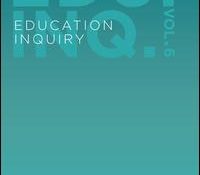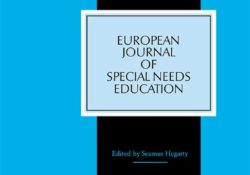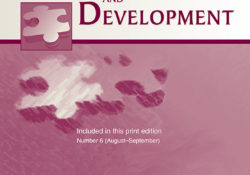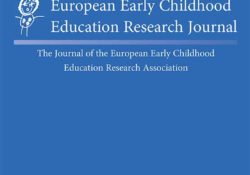tandfonline.com har udgivet en rapport under søgningen “Teacher Education Mathematics”: The Effects of COVID-19 on Young Children’s and Their Parents’ Activities at Home Link til kilde
Like this:
Like Loading...

tandfonline.com har udgivet en rapport under søgningen “Teacher Education Mathematics”: ABSTRACT ABSTRACT Motivated by earlier research highlighting Swedish teachers’ beliefs that the setting of homework compromises deep-seated principles of educational equity, this paper presents an exploratory study of Swedish parents’ perspectives on homework in their year-one children’s learning. Twenty-five parents, drawn from three demographically different schools in the Stockholm region, participated in semi-structured interviews. The interviews, broadly focused on how parents support their children’s learning and including questions about homework in general and mathematics homework in particular, were transcribed and data subjected to a constant comparison analytical process. This yielded four broad themes, highlighting considerable variation in how parents perceive the relationship between homework and educational equity. First, all parents spoke appreciatively of their children receiving reading homework and, in… Continue Reading →
Like this:
Like Loading...
eric.ed.gov har udgivet: In many respects, Hispanic families share the aspirations and anxieties of many other families nationwide: They are keenly focused on the role completing high school and going to college will play in their children’s future. Students and young adults see success in school and college as key to interesting work and a prosperous future, and most are optimistic about their prospects. Yet Hispanic parents, students and young adults also describe concerns, ideas, approaches and relationships with the public school system in ways that are sometimes distinctive. This brief, graphical summary, based on Public Agenda surveys taken over the last few years, lays out the chief differences and similarities. Summarized findings are taken from three different Public Agenda reports: (1) “Life after High School: Young People Talk about… Continue Reading →
Like this:
Like Loading...
tandfonline.com har udgivet en rapport under søgningen “Teacher Education Mathematics”: Abstract Educational disruption due to COVID-19 ushered in dramatically different learning realities in Ireland. Our research explored the experiences of children, young people and parents during the first period of ‘schooling at home’ (SAH) at the end of that academic year. An anonymous online survey, guided by social constructivist emphases, yielded responses from 2733 parents and 1189 students from primary and second-level schools. Substantial evidence emerged of parent-perceived and student-perceived negative psychosocial impacts of SAH on students. Further, our research clarified the exceptional stress experienced by parents in attempting to support SAH. A novel finding was student perceptions of having learned less during SAH, most likely due to significant declines in academic engagement. Recommendations for potential future periods of SAH… Continue Reading →
Like this:
Like Loading...
tandfonline.com har udgivet en rapport under søgningen “Teacher Education Mathematics”: ABSTRACT ABSTRACT Growing tension within the early childhood education sector of Aotearoa New Zealand around the roles teachers and families might play in preparing children for success in school suggests that notions of readiness are gaining traction. In this paper, we draw on data from three empirical studies to position families as experts in the lives of their children, valuing the linguistically and culturally diverse literacies children carry from their whānau, homes, and communities in bicultural and superdiverse Aotearoa New Zealand. Exemplars of family pedagogies framed through a funds of knowledge theoretical lens, provide counternarratives to deficit discourses regarding children’s language competencies, and challenge the encroaching reductionist notion of the ‘language gap’ and narrow views of early literacy promoted in… Continue Reading →
Like this:
Like Loading...
eric.ed.gov har udgivet: Involving parents in young children’s literacy development is a challenge being met by many school districts. Several programs and strategies are being used at various levels to enhance literacy development and to address literacy needs of parents. Suggestions for preschool children include playing classical music, participating in meaningful learning experiences, and reading aloud. In addition, Even Start and Mothers Understanding Methods of Schooling are effective family-based literacy programs. Strategies for use with elementary school students and their parents include: morning meetings for parents at school to share information and present cooperative ventures; home visitor teams to bring parents into school; Reading (or Math) Family Nights; Family Technology Resource Centers offering child care and computer and literacy training; and the hiring of parents as ombudsmen. Strategies tried at… Continue Reading →
Like this:
Like Loading...

tandfonline.com har udgivet en rapport under søgningen “Teacher Education Mathematics”: ABSTRACT ABSTRACT The Corona virus (COVID-19) crisis forced many countries to follow strict protocols ordering schools to close. With schools under lockdown, homeschooling has become the only form of schooling available. Reports have indicated that parents and students have struggled with the challenges of homeschooling. Against this background, this study explored primary school students and parents’ educational chances and challenges during homeschooling in two countries: Mexico and Germany. Comparing these two countries can shed light into potential differences of how inclusive approaches have been incorporated in homeschooling. Following a qualitative approach, thirteen semi-structured interviews were conducted with parents and school students. Results from a qualitative content analysis revealed that parents across both countries face challenges to organise homeschooling and motivate… Continue Reading →
Like this:
Like Loading...
eric.ed.gov har udgivet: Children benefit academically when parents and educators work together. For this reason, parents’ involvement in their children’s education is a priority of the “No Child Left Behind Act of 2001.” But a strong connection between parents and educators does not come about automatically. Both parties may need to learn new roles and skills and develop the confidence to use them, especially as parents move beyond traditional activities, like helping children with homework, and toward shared responsibility for school improvement. Intermediary organizations, like federally funded Parental Information and Resource Centers (PIRCs), can help. Drawing on lessons learned from five PIRCs across the country that have been meeting this challenge, this guide shares promising strategies for increasing effective parent involvement. It explains “how to” strategies that the Parent Information… Continue Reading →
Like this:
Like Loading...
eric.ed.gov har udgivet: This report presents the findings from Project Tomorrow’s 2007 Speak Up Survey, informing international discussions about how to improve science learning in the 21st century through an exploration of student, teacher, parent, and school leader attitudes about science education. Project Tomorrow administered its survey in all 50 United States, the District of Columbia, American Department of Defense Schools, Canada, Mexico, and Australia. The top participating states included: Texas, California, Arizona, Illinois, Alabama, Maryland, North Carolina, Pennsylvania, Florida, and Michigan. Project Tomorrow surveyed 319,223 K-12 students, 25,544 teachers, 19,726 parents, and 3,263 school leaders. Respondents were from 3,729 schools and 867 districts. Ninety-seven percent were from public schools; three percent were from private schools. School locations were 32 percent urban, 40 percent suburban, and 29 percent rural. Forty-three… Continue Reading →
Like this:
Like Loading...
tandfonline.com har udgivet en rapport under søgningen “Teacher Education Mathematics”: ABSTRACT ABSTRACT Educational policies increasingly emphasise early childhood science engagement. As key influencers in children’s early learning, parents (n = 85) attending a science workshop in three urban schools in Ireland were surveyed regarding their attitudes towards science. Seventy per cent of parents believed that science education should begin in the pre-school years, before the age of four. Despite high levels of education, at least half of the parents expressed some lack of confidence in talking about, and in doing science with, their young children. Parents who reported less confidence in doing science activities with their children also reported reduced frequency of activities for five out of the seven science learning opportunities listed. Mothers, compared to fathers, reported less confidence in doing… Continue Reading →
Like this:
Like Loading...





